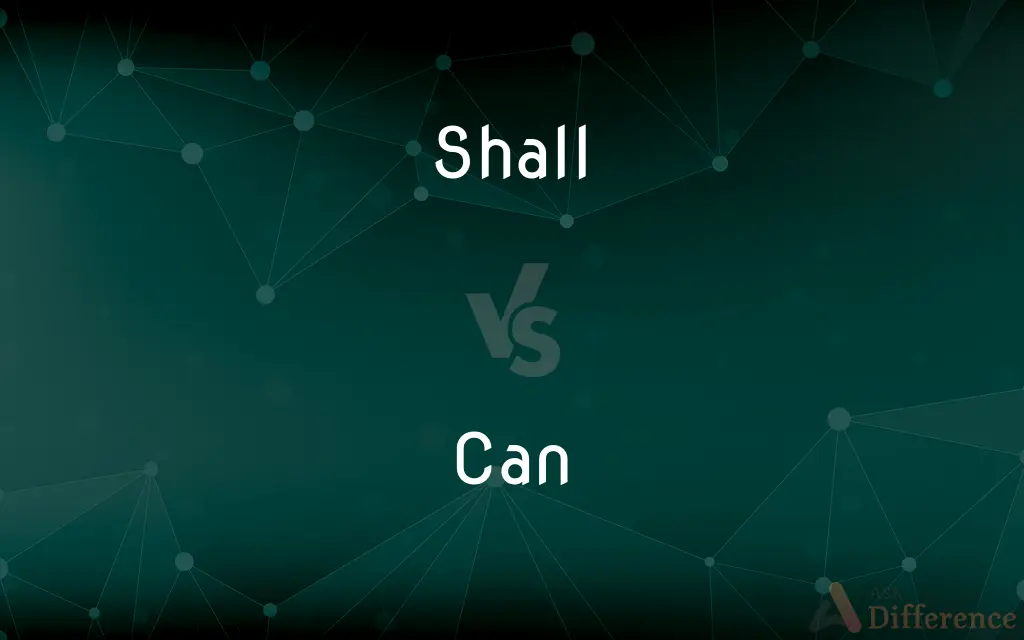Shall vs. Can — What's the Difference?

Difference Between Shall and Can
ADVERTISEMENT
Compare with Definitions
Shall
Used before a verb to indicate the simple future tense in the first person singular or plural.
I shall sing in the choir tomorrow.
I hope that we shall win the game.
Can
Be able to
He can't afford it
They can run fast
I could hear footsteps
Shall
Used similarly to indicate determination or obligation in the second and third persons singular or plural.
(determination): You shall go to the ball!
(obligation): Citizens shall provide proof of identity.
Can
Be permitted to
You can use the phone if you want to
Nobody could legally drink on the premises
Shall
Used in questions with the first person singular or plural to suggest a possible future action.
Shall I help you with that?
Shall we go out later?
Let us examine that, shall we?
ADVERTISEMENT
Can
Used to request someone to do something
Can you open the window?
Can't you leave me alone?
Shall
(obsolete) To owe.
Can
Preserve (food) in a can
Sardines and anchovies are worth the extra money if canned in olive oil
Shall
To owe; to be under obligation for.
Can
Dismiss from a job
He was canned because of a tiff over promotion
Shall
To be obliged; must.
Can
A cylindrical metal container
A can of paint
A petrol can
Can
Prison
Our friends will get a year or two in the can
Can
The toilet
She walks in and has to use the can
Can
Headphones.
Can
A woman's breasts.
Can
A usually cylindrical metal container.
Can
An airtight container, usually made of tin-coated iron, in which foods or beverages are preserved.
Can
The contents of such a container
Ate a can of beans.
Can
(Slang) A jail or prison.
Can
(Slang) A toilet or restroom.
Can
(Slang) The buttocks.
Can
(Slang) A naval destroyer.
Can
To seal in an airtight container for future use; preserve
Canning peaches.
Can
(Slang) To make a recording of
Can the audience's applause for a TV comedy show.
Can
To end the employment of; fire.
Can
To put an end or stop to
Canned the TV show after one season.
Told the students to can the chatter.
Can
To solicit cash donations for a charity or other organization such as a club or amateur sports team by holding out a can or other container in a public place.
Can
To know how to; to be able to.
She can speak English, French, and German.
I can play football.
Can you remember your fifth birthday?
Can
May; to be permitted or enabled to.
You can go outside and play when you're finished with your homework.
Can I use your pen?
Can
(modal auxiliary verb, defective) To have the potential to; be possible.
Can it be Friday already?
Teenagers can really try their parents' patience.
Animals can experience emotions.
Can
Used with verbs of perception.
Can you hear that?.
I can feel the baby moving inside me.
Can
To know.
Can
To seal in a can.
They canned air to sell as a novelty to tourists.
Can
To preserve by heating and sealing in a jar or can.
They spent August canning fruit and vegetables.
Can
To discard, scrap or terminate (an idea, project, etc.).
He canned the whole project because he thought it would fail.
Can
To shut up.
Can your gob.
Can
To fire or dismiss an employee.
The boss canned him for speaking out.
Can
To hole the ball.
Can
(transitive) To cover (the fuel element in a nuclear reactor) with a protective cover.
Can
A more or less cylindrical vessel for liquids, usually of steel or aluminium, but sometimes of plastic, and with a carrying handle over the top.
Can
A container used to carry and dispense water for plants (a watering can).
Can
A tin-plate canister, often cylindrical, for preserved foods such as fruit, meat, or fish.
Can
A chamber pot, now a toilet or lavatory.
Shit or get off the can.
Bob's in the can. You can wait a few minutes or just leave it with me.
Can
Buttocks.
Can
(slang) Jail or prison.
Bob's in the can. He won't be back for a few years.
Can
Headphones.
Can
(archaic) A drinking cup.
Can
(nautical) A cube-shaped buoy or marker used to denote a port-side lateral mark
Can
A chimney pot.
Can
An E-meter used in Scientology auditing.
Can
An ounce (or sometimes, two ounces) of marijuana.
Can
A protective cover for the fuel element in a nuclear reactor.
Can
An obs. form of began, imp. & p. p. of Begin, sometimes used in old poetry. [See Gan.]
With gentle words he can faile gree.
Can
A drinking cup; a vessel for holding liquids.
Fill the cup and fill can,Have a rouse before the morn.
Can
A vessel or case of tinned iron or of sheet metal, of various forms, but usually cylindrical; as, a can of tomatoes; an oil can; a milk can.
Can
To preserve by putting in sealed cans
Can
To know; to understand.
I can rimes of Rodin Hood.
I can no Latin, quod she.
Let the priest in surplice white,That defunctive music can.
Can
To be able to do; to have power or influence.
The will of Him who all things can.
For what, alas, can these my single arms?
Mæcænas and Agrippa, who can most with Cæsar.
Can
To be able; - followed by an infinitive without to; as, I can go, but do not wish to.
Yet he could not but acknowledge to himself that there was something calculated to impress awe, . . . in the sudden appearances and vanishings . . . of the masque
Tom felt that this was a rebuff for him, and could not but understand it as a left-handed hit at his employer.
Can
Airtight sealed metal container for food or drink or paint etc.
Can
The quantity contained in a can
Can
A buoy with a round bottom and conical top
Can
The fleshy part of the human body that you sit on;
He deserves a good kick in the butt
Are you going to sit on your fanny and do nothing?
Can
A plumbing fixture for defecation and urination
Can
A room equipped with toilet facilities
Can
Preserve in a can or tin;
Tinned foods are not very tasty
Can
Terminate the employment of;
The boss fired his secretary today
The company terminated 25% of its workers
Share Your Discovery

Previous Comparison
Worry vs. Warry
Next Comparison
Analyze vs. Investigate














































